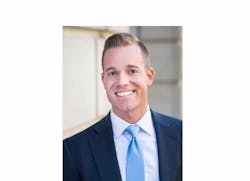Q&A With Mike Goscinski, NAMA’s Director Of Federal And State Affairs
This week, the Department of Homeland Security (DHS) specifically included unattended retail and vending as critical infrastructure. This classifies businesses in convenience services as essential, allowing operators to stay open and provide food and beverages to their clients during the coronavirus pandemic. Automatic Merchandiser spoke with Mike Goscinski, NAMA’s director of federal and state affairs, to learn more about this DHS designation.
The DHS has included vending and unattended retail specifically as critical infrastructure. Why is this important to the industry?
This is a huge benefit for our industry as governors are instituting restrictions, stay-at-home orders, and business closures in their own states. There are now nearly 40 states who have issued guidance aligning with the DHS memo. The latest edit of the DHS memo that was released over the weekend specifically included NAMA’s suggested edit to add “unattended retail and vending” under “Food and Agriculture” as essential businesses critical to the infrastructure of the United States that they are able to continue to operate.
On the NAMA coronavirus resource webpage we have developed a state response tracker showing which states have issued orders and are following the DHS guidance. It's in an easily digestible spreadsheet for our members in those states to be able to understand if they’re able to continue operations.
How did NAMA’s Government Affairs team make this happen?
It's been a process; taking about two-and-a-half weeks. Once the writing was on the wall that the United States was going to have to follow similar measures that they did in Europe and throughout the Eastern world, we determined that we would need to work with the government to make sure that our members were able to continue operating. So, we quickly coalesced and worked with our industry partners in Washington, D.C.
NAMA and its food and beverage trade association partners have been working together to quickly mobilize, reaching out to the Department of Homeland Security. Knowing that governors of individual states would be responsible for handling their own jurisdictions — we thought it would be pertinent for them to issue a critical infrastructure memorandum, and for states to have that guidance from the federal government on which industries are critical to the day to day operations of the United States.
We started working right away in opening up a dialogue with the Department and getting that memorandum drafted. It went through several renditions since it was first released the week of March 16th, and we've been able to clarify and refine it since then. When they first released it, that first bullet point said, “grocery stores, pharmacies and retail establishments selling food and beverage.” We continued to explain the critical role that the convenience services industry plays to get them to actively change it in this latest rendition last weekend, with specific language that deems unattended retail and vending as critical infrastructure.
Moving ahead, are there other designations that the GA team is working on to continue to protect the industry?
Yes, our main focus right now is working with the remaining states who have yet to enact stay-at-home orders – making sure that if they do make motions to either shut down businesses or restrict person-to-person contact, that they follow the DHS memorandum.
NAMA’s Government Affairs team covers advocacy from a federal level and all 50 states on behalf of the industry. Can you tell me more about specific roles and responsibilities?
Eric Dell leads our entire team, he's the senior vice president of external affairs. I'm the director of federal and state affairs; overseeing our main lobbying arm both at the federal and across all state level. We have Sandy Larson, located out West, who handles the Mississippi West and covers lobbying in those states, and Wes Fisher, who is in Washington, D.C., and covers the Mississippi East and lobbying in those states. So, it's a nice division of responsibility where we have folks focusing on one half of the country and the other, and I assist in overseeing and helping them with all 50, and am able to focus my attention here in Washington, D.C. at the federal level.
Who should folks in the industry reach out to with questions?
The Government Affairs team is always available. They can reach out to myself, Sandy Larson or Wes Fisher anytime. All of our information is on the NAMA website and all of this information — including all the information we're tracking around COVID-19 — is on our coronavirus response page.
Additionally, we are hosting periodic webinars, our members can take part live, or they will be available on the website for on demand viewing. They will all be available on the coronavirus response page as well.
